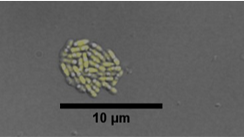
Bacterial production of polyhydroxybutyrate (PHB) is frequently limited by storage space within the bacterial cell. For the bacteria known to be heavy producers of PHB, the PHB granule can occupy up to 95% of the cell volume. As part of my goal to increase PHB yields from bacterial cultures, I have been playing with genetic control of cell volumes. The idea is that if the cell volume can be increased, perhaps the PHB yield can also be increased.
A typical Rhodobacter sphaeroides cell (rod shaped) will have roughly the dimension of 1 µm in length and 0.5 µm in width. The picture to the left shows Rhodobacter strain that I have genetically manipulated. The average cell length is greater than 50 µm (up to 100 µm in length!). Additionally, the PHB granules have been labelled with a yellow fluorescent protein called mVenus.
Now that the cell volume has been increased by at least 30 fold, the next step is to make additional genetic adjustments so that the cells fill the remaining space with PHB.

The final step will be then to test wether these modified (elongated) cells are capable of greater yields than the original strains when grown under fermentation conditions. The elongated cells, for example, may have serious growth problems that arise through turbulence. Longer cells might break in two pieces. This might be an advantage if breaking cells die and release their PHB granules (simplifying PHB harvesting). Death of older, longer cells could make space and free up nutrients for younger cells.
Left are Rhodobacter colony of cells showing the normal cell form, i.e., 1 x 0.5 µm, also with labelled PHB granules.
As a background for this project, the goal is to decrease the cost of PHB production so that our modern lifestyle can be supported by using environmentally friendly bioplastic rather than the conventional oil-based plastics that are damaging our environment.
Update August 2023
Manuscript covering the technical details has now been peer reviewed and published:
https://pubs.acs.org/doi/10.1021/acssynbio.3c00251
